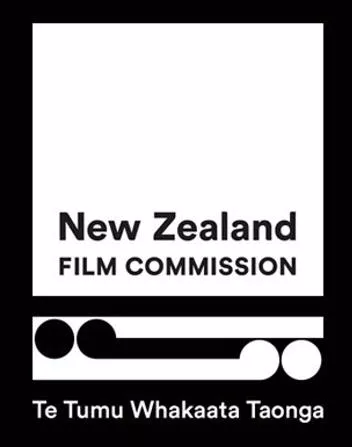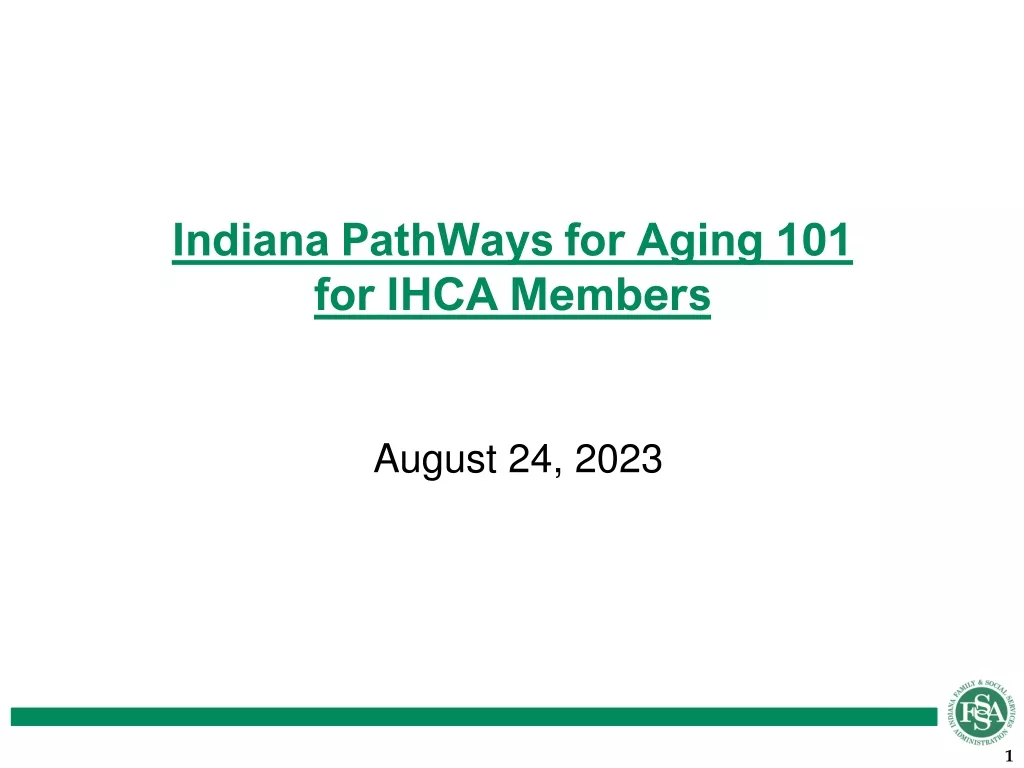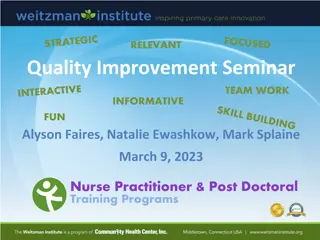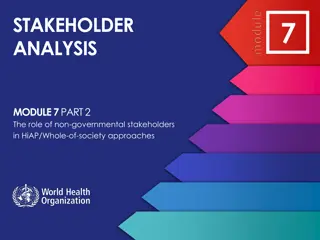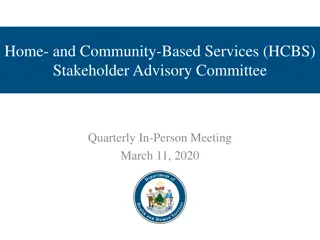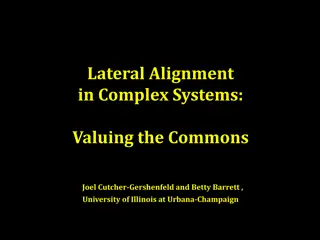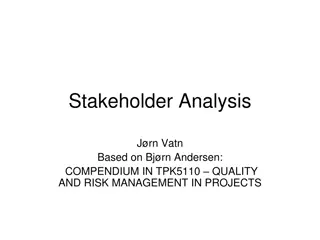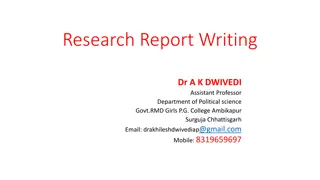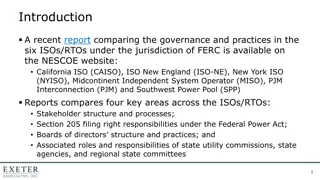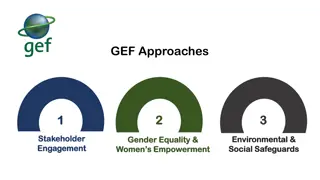Stakeholder Research Report: October 2023
The stakeholder research report for October 2023 focuses on the New Zealand Film Commission and its key stakeholders in the screen industry. The report highlights stakeholders' satisfaction levels, experiences, and opinions on the Film Commission's role in supporting domestic stories and attracting international productions. It also identifies areas for improvement and provides insights into industry tenure, funding, outcomes, ethnicity, gender, and domicile. Overall, stakeholders view the Film Commission positively but see room for enhancement in certain areas.
Download Presentation

Please find below an Image/Link to download the presentation.
The content on the website is provided AS IS for your information and personal use only. It may not be sold, licensed, or shared on other websites without obtaining consent from the author. Download presentation by click this link. If you encounter any issues during the download, it is possible that the publisher has removed the file from their server.
E N D
Presentation Transcript
Stakeholder research report October 2023
METHOD TARGET AUDIENCE FIELDWORK DATES SAMPLE SIZE METHOD New Zealand Film Commission s key stakeholders including stakeholders from the screen industry, support industries, and Government. Email invitation to an online survey. Sample provided by New Zealand Film Commission. 129 stakeholders completed the survey. 6 to 25 September 2023. K A N T A R P U B L I C 2 0 2 3 | 2
KEY KEY RESULTS RESULTS Fulfilling the Film Commission s role Experience of, and interaction with, the Film Commission Two thirds of stakeholders are satisfied with the interactions they have with people at the Film Commission. In contrast only 50% of stakeholders are satisfied with the support from NZFC at a more general level. The majority of stakeholders think the Film Commission is performing its roles well. However, almost all stakeholders believe there is room for improvement, as relatively few think the Commission is performing its roles extremely well. 65% 61% 61% 55% 54% 50% 74% Interactions with NZFC people Experience of Talent Development Experience of team for screen incentives etc. Experience of team for screen story marketing Experience of team for development and production funding The support NZFC provides you / your organisation of stakeholders think the Film Commission is doing well (extremely, very, or somewhat) at supporting and growing a diverse range of domestic stories The level of support provided by the commission featured at the top of the list of what the NZFC is doing well, and at the top of the list of what the agency needs to improve on. The survey comments highlight that the people stakeholders deal with feel supportive and passionate. On the improvement side, comments point to more systemic issues that leave stakeholders feeling unsupported (for example a lack of resource within NZFC teams, funding structures, or systems and processes). 80% of stakeholders think the Film Commission is doing well (extremely, very, or somewhat) at attracting international productions to tell their stories here
The overall stakeholder experience 1
Three-quarters of stakeholders think the NZ Film Commission is performing extremely, very, or somewhat well in supporting and growing a diverse range of domestic stories. Most stakeholders, however, think there is a least a little room for improvement, as just 5% think the Commission is performing this role extremely well. Q. How well do you think the New Zealand Film Commission is performing in its role to support and grow a diverse range of domestic stories to be told here and seen everywhere? Net well (extremely / very well / somewhat) 5% 9% INDUSTRY TENURE FUNDING OUTCOME ETHNIC GROUP GENDER DOMICILE FUNDING 95% 90% 18% 83% 82% 81% 78% 78% 74% Nett well 75% 31% 74% 73% 73% 70% 70% 67% NZ NZ Maori (n=19) Other Ethnic group (n=23) Male (n=52) Female (n=58) New Zealand (n=108) Overseas (n=21) Up to 15 years (n=21) 16 to 20 years (n=22) 20 or more years (n=86) Applied for funding (n=93) Haven't applied for funding (n=36) Approved (n=81) Declined (n=26) European (n=82) 38% Extremely well Very well Somewhat well Not that well Not at all well Source: Q4. How well do you think the New Zealand Film Commission is performing in its role to support and grow a diverse range of domestic stories to be told here and seen everywhere? Sample size: All stakeholders, Oct 23 n=129. Subgroups base size in brackets below each label. Excludes don t know / not applicable responses. K A N T A R P U B L I C 2 0 2 3 | 5
Eight in ten stakeholders think the Film Commission is doing extremely, very, or somewhat well in attracting international productions. Again, most stakeholders think there is at least a little room for improvement, as only 3% think the Commission is performing this role extremely well. Q. How well do you think the New Zealand Film Commission is performing in its role to attract international productions to tell their stories here? Net well (extremely / very well / somewhat) 3% 5% INDUSTRY TENURE FUNDING OUTCOME ETHNIC GROUP GENDER DOMICILE FUNDING 15% 93% 93% 87% 82% 81% 81% 81% 80% 79% 78% 76% 76% 75% 80% Nett well 72% 38% 39% NZ NZ Maori (n=15) Other Ethnic Group (n=17) Male (n=43) Female (n=47) New Zealand (n=89) Overseas (n=16) Up to 15 years (n=17) 16 to 20 years (n=15) 20 years or more (n=73) Applied for funding (n=77) Haven't applied for funding (n=28) Approved (n=67) Declined (n=20) European (n=72) Extremely well Very well Somewhat well Not that well Not at all well Source: Q5. How well do you think the New Zealand Film Commission is performing in its role to attract international productions to tell their stories here? Sample size: All stakeholders able to provide an opinion, Oct 23 n=105. Subgroups base size in brackets below each label. Excludes don t know / not applicable responses. K A N T A R P U B L I C 2 0 2 3 | 6
Two thirds of stakeholders are satisfied with their interactions with people at the Commission. By contrast only half are satisfied with the support they receive. The need for more support is the main theme of comments made around areas where the Film Commission needs to improve. Q. Thinking about your dealings with specific teams, how satisfied are you with Nett very satisfied / satisfied* Very satisfied Satisfied Neither satisfied nor dissatisfied Dissatisfied Very dissatisfied Your interactions with the people at the Film Commission 29% 37% 21% 11% 2% 65% (n=126) Your experience in dealing with the team responsible for screen story marketing 24% 31% 26% 9% 10% 55% (n=89) Your experience in dealing with the team responsible for screen incentives, co-productions and international screen attractions 21% 39% 22% 14% 3% 61% (n=94) Your experience in dealing with team responsible for development and production funding (including Te Puna Kairangi Premium Fund) 19% 34% 23% 16% 7% 54% (n=108) The support the Film Commission is providing you and/or organisation 18% 32% 18% 25% 6% 50% (n=115) Your experience in dealing with the team responsible for Talent Development 18% 43% 22% 11% 6% 61% (n=97) Source: Q6. Thinking about your dealings with specific teams, how satisfied are you with Sample size: All stakeholders able to provide an opinion, sample size varies by statement, provided in brackets beside each statement. Excludes don t know / not applicable responses. *Nett may be higher or lower than very satisfied + satisfied due to rounding K A N T A R P U B L I C 2 0 2 3 | 7
Almost seven in ten agree that the Film Commission actively supports diversity and inclusion. In contrast, many fewer think that the NZFC supports the screen sector to adopt more environmentally sustainable practices. Q. How strongly do you agree or disagree with the following statements about the New Zealand Film Commission? Nett agree (strongly / slightly) Strongly agree Slightly agree Neither agree nor disagree Slightly disagree Strongly disagree NZFC actively identifies, supports and promotes diversity and inclusion* offering an inclusive and accessible environment to stakeholders 32% 37% 14% 9% 8% 69% (n=118) New Zealand is a world leading destination for 27% 40% 12% 16% 5% 67% screen production (n=119) NZFC supports the screen sector to adopt more environmentally sustainable practices 12% 25% 41% 13% 10% 37% (n=101) * Note: The following definitions were provided around diversity and inclusion: Diversity recognises, respects and celebrates visible and non-visible differences of screen industry practitioners, organisations, audiences and communities. Inclusion is a practice that removes barriers and provides the conditions for equitable opportunities, access to resources and meaningful collaboration. Source: Q8. How strongly do you agree or disagree with the following statements about the New Zealand Film Commission? Sample size: All stakeholders able to provide an opinion, sample size varies by statement, provided in brackets beside each statement. Excludes don t know / not applicable responses. K A N T A R P U B L I C 2 0 2 3 | 8
When asked what the Film Commission could do to improve diversity and inclusion, comments centred on the need for systemic change in the funding and support models, alongside more of a focus on new and emerging filmmakers. WHAT PEOPLE THINK THE FILM COMMISSION COULD DO TO BETTER IDENTIFY, SUPPORT, AND DEVELOP DIVERSITY Systemic changes Move away from box-ticking Focus on emerging filmmakers Stop dumbing down diversity into an anxious tick box report. It feels insulting to feel that your work is being assessed as part of a quota. Even though they are not huge money spinners we could be working harder to grow documentaries about things that currently have little presence, not just chasing after 'representation'. Find a way up the ladder, better career paths for diverse talent. A lot of diverse talent get jammed up in the emerging space. Many stakeholders and higher ups are still not open to collaborating with younger filmmakers unless explicitly mandated to. Engage in good faith with industry organisations whose roles are to advocate for diversity and inclusion and, most importantly, not set these organisations up to compete against each other. Stop enabling producers to entirely own the IP of these very people. Stop producers dispossessing them of their stories. The NZFC actually has the power to do this - it just doesn't have the political appetite. Some past projects and practices have abused indigenous film makers, minority film makers through 'box check' funding enabled by the NZFC. The NZFC can support diversity in our films by financing younger more exciting filmmakers and allowing them to make mistakes. Give money to filmmakers who have a vision, who might make a disaster of a film, but be brave and allow them to grow. The current feature film investment model requiring international attachments before production disadvantages culturally authentic films. This requirement forces producers to attach bankable talent which may not be appropriate for NZ stories. And it sets up a litmus test which isn t appropriate for most indigenous and diverse projects. Prefer to see a more nuanced approach. The constant box-ticking misses some opportunities. Now the targets seem to be more around ethnicity, which I support, but see some groups (gay and white, female and white) who have never been supported now missing out all over again. Age also needs representation but is seldom considered Rautaki department is a good step. Could do more to develop and support stories and filmmakers from New Zealand's wider multi- cultural ethnicities and be more open to stories from those groups. Source: Q9. What do you think the Film Commission could do to better identify, support, and develop diversity? Answered by those who do not strongly agree that the NZFC actively identifies, supports and promotes diversity and inclusion offering an inclusive and accessible environment to stakeholders K A N T A R P U B L I C 2 0 2 3 | 9
Sustainability is an area that just 37% agree the Film Commission is doing a good job on supporting. However, a theme emerging from a follow-up question highlights that some do not see it as the NZFC s role to push for sustainability. There is an expectation that the Commission provide education and resources, though some would like to see sustainability mandated. WHAT PEOPLE THINK THE FILM COMMISSION COULD DO TO SUPPORT THE SECTOR TO DEVELOP MORE ENVIRONMENTALLY SUSTAINABLE PRACTICES Mandate sustainability Believe it is not the role of NZFC Educate and inform This is not the remit of the Film Commission. They should support it absolutely and encourage sustainability through levers in the rebate - but this is not the core business of this organisation. Include environmental sustainability for the screen sector information on its website, e.g., Greening the Screen and make mention of it in funding criteria. Make productions pay for their waste and adopt cleaner practices. Ensure they have a waste management can for old sets and toxic waste. Highlight and promote activities, movements or business that develop these practices for the screen industry. Feature links or tips on their website. Make it mandatory to have an environmental plan/carbon counting for productions and allow additional funding for this and offsetting. I'm not sure this should be a driving concern for funding. This is something to be dealt with in wider government regulation and policy. To think the NZFC will have impact is narrow thinking that misunderstands how carbon emissions are systemically built into infrastructure at a societal level. Suggest funding for Filmmakers to attend workshops to demystify sustainable practices in film/tv and understand its importance before the budgets are set. All funding is contracted to deliver certain Green outcomes that are measurable environment processes, e.g., green prescriptions by doctors - support guilds to have sustainable best practices hui several times a year. The first question is whether that is the Film Commission's role, or the producer's role. While the Film Commission could ask producers to provide environmentally sustainable practice policies - will this just be a piece of paper to tick the box? Support and acknowledge producer initiatives - the place to start is at the NZFC. Research and acknowledge the many initiatives already happening in all sectors of the industry and the wider arts sector. Ensure sustainability co-ordinators are budgeted for in every NZFC funded production. Source: Q10. What do you think the Film Commission could do to support the screen sector to adopt more environmentally sustainable practices? Answered by those who do not strongly agree that the NZFC supports the screen sector to adopt more environmentally sustainable practices K A N T A R P U B L I C 2 0 2 3 | 1 0
When asked what the Film Commission does well, support both professional and financial are the two main themes that emerged from comments. What is the Film Commission doing well? (Open-ended responses coded into themes) Shows only those themes achieving 4% or more Good support /support new filmmakers Connecting people /meeting opportunities 26% 7% Financial support /Premium Fund /rebates/grants Well informed/knowledgeable staff/professional 20% 7% International promotion of NZ industry/locations /events Do a very good job /teams do a very good job 14% 7% Friendly/caring/approachable people Offer good advice / feedback /discussion on assessments 13% 6% Talent development Diverse talent/filmmakers/voices/output 13% 6% Care about their work / passionate about NZ film Providing opportunities /development programmes/workshops 12% 6% Helpful /efficient Maintaining stability /surviving tumultuous times 11% 6% Responsive/reflective /available/accessible Negative comments 11% 6% Other Marketing 11% 5% Good communication /informative Supporting NZ stories 9% 4% Make/process NZ stories/shorts/feature films Support of films once completed/ festivals/local film distribution 8% 4% Supporting Maori /Maori filmmakers /Rautaki Maori support 7% Source: Q3. Thinking about the last two years, what do you think the Film Commission has been doing well and what do you think the Film Commission needs to improve on? Sample size: All stakeholders able to provide an opinion, n=107. Excludes don t know / not applicable responses. K A N T A R P U B L I C 2 0 2 3 | 1 1
What they said: Comments relating to the top areas where the Film Commission is seen to be doing well Friendly & approachable Good support Financial support International promotion I think the Film Commission is genuinely doing its best to help and support the industry. While I know some get frustrated, I have found them to be quick to address issues and respond with all staff doing the best job they can. Overseas markets are where NZFC perform at their very best. They support Kiwi filmmakers on the ground, set up excellent meeting opportunities, and achieve visibility for NZ and NZ films which other comparable countries do not do. Bravo. Engaging with stakeholders, administrating public funds in an appropriate way, funding some great films. Dealing with the NZFC during the film making process at every stage has been satisfying to say the least. The NZFC team, are all professionals and are a joy to work with. Providing a financial support for NZ Producers to make globally appealing content as the NZ broadcasters cannot provide much budget at all. I think the NZFC has supported film makers well during the very difficult time of COVID and has been as responsive as they can be within the governance framework to help people through a difficult time. I appreciated their creative support and care. I felt like they understood what I was trying to do and were invested in supporting me. Working hard to support NZ producers at markets. Maintaining a range of relationships with people/institutions/financiers/intern ational producers who are interested in the NZ industry. I think the Premium Fund was a great initiative and has produced some great results. Staff are lovely to deal with; they all appear as genuinely caring for the producers and films they support; they are responsive to emails and approachable. Support for talent development programmes, early development support, individual professional development support. Flies the flag for Aotearoa films domestically and internationally. Providing financial support for filmmakers who are invited to international festivals, labs and development courses. We have had excellent help and support around NZSPG productions. Genuine sense of caring and support beyond just the financials. Promoting NZ on the global stage. Source: Q3. Thinking about the last two years, what do you think the Film Commission has been doing well and what do you think the Film Commission needs to improve on? Sample size: All stakeholders able to provide an opinion, n=107. Excludes don t know / not applicable responses. K A N T A R P U B L I C 2 0 2 3 | 1 2
When asked what the Film Commission needs to improve on support and funding were the two main themes again, followed closely by the need for better communication. What does the Film Commission need to improve on? (Open-ended responses coded into themes) Shows only those themes achieving 4% or more Need more support in general 20% Reward merit and success 5% Access to funding /profit sharing 19% Need clearer policies, procedures, and systems 5% Need better communication /better feedback 17% Provide more leadership 4% Improve timeliness and response times 12% Be fair and reasonable 4% Overly complicated processes/reduce bureaucracy 12% Need to embrace new technologies/online /streaming 4% Need review of funding decisions /processes 12% Better connections between writers/directors and NZFC 4% Need more engagement 10% Reduce conflicts of interest /favourites 4% Take more risks 9% Improve the portal/website 4% International /co-productions incentives and finance 9% More consistency 4% Relationships /partnerships with the NZ industry 9% Make more films /NZ films 4% More transparency 7% Better connections between departments/stakeholders 4% Be more enabling 7% Have clear pathways (from talent development to development) 4% Need more funding as costs increase 6% More respect 4% Out of touch with current realities of film/TV making 6% Make it easier for new companies/young filmmakers 5% Be more flexible 5% Source: Q3. Thinking about the last two years, what do you think the Film Commission has been doing well and what do you think the Film Commission needs to improve on? Sample size: All stakeholders able to provide an opinion, n=113. Excludes don t know / not applicable responses. K A N T A R P U B L I C 2 0 2 3 | 1 3
What they said: Comments relating to the top areas where the Film Commission is seen to need improvement More support Access to funding Better communication Improve timeliness Improve communication to NZ production service providers, include more transparency around international producer enquiries, engage more with local infrastructure providers, work more collaboratively with those competing with other countries. Slow, slow response times to emails. If you don't have certain relationships with and mobile numbers of the key staff you need to communicate with, there's a bit of silence. Simplifying the funding application process and updating the funding criteria to accurately reflect the changing media landscape over the last five years with the rise of streaming giants entering the market. Supporting NZ screen businesses. I really don't think it's a priority for them and the outcome is growth for internationally owned multination screen business at a cost of sustainability for NZ owned screen businesses. The main form of communication from most NZFC staff is email, and often these are received after 6pm on workdays. With many important updates, information about funding rounds, or opportunities appearing in our inboxes on a Friday evening. Funding good scripts, different voices, understanding the difference between their opinion and something that may actually be good. The calibre and experience of the [external] assessors fluctuates widely, as does the written feedback provided. Some assessors clearly have no idea how to feedback properly to creatives. Supporting young and upcoming filmmakers not only with funding but in general. Helping navigating the film industry with more ease by providing support and encouragement within the industry. Access to funding, reviewing decisions made on funding, eg, all the same people seem to get funded. They seem to have favourites. Moving projects more quickly through development and into production. More streamlined pathways. Greater support for directors and writers during the feature film making process. It s feels very producer focused. Poor to nil systems, overly bureaucratic, woeful communication & terminally slow responses. Nothing happens in a timely manner. It is frustrating waiting for a contract, or an updated document. Less gate keeper role, they should understand the remit as a funding agency and not supposed guardians of NZ film. The funding department support/advice offered is inconsistent and unreliable. Greater support, more flexibility, availability to discuss ways projects can be supported. Source: Q3. Thinking about the last two years, what do you think the Film Commission has been doing well and what do you think the Film Commission needs to improve on? Sample size: All stakeholders able to provide an opinion, n=107. Excludes don t know / not applicable responses. K A N T A R P U B L I C 2 0 2 3 | 1 4
The stakeholder experience by stakeholder group 2
Government stakeholders and consultants are the most likely to think the Film Commission is performing well in its role to support and grow domestic stories. In contrast, guild and student/teacher/education providers are the least likely to believe the Film Commission is performing this role well. Q. How well do you think the New Zealand Film Commission is performing in its role to support and grow a diverse range of domestic stories to be told here and seen everywhere? Net well (extremely / very well / somewhat) 74% 86% 83% 81% 81% 79% 77% 77% 75% 75% 73% 72% 64% 47% 44% 5% 4% 5% 6% 9% 13% 9% 11% 20% 33% 25% 13% 30% 31% 43% 33% 50% 53% 34% 36% 57% 33% 58% 27% 11% 38% 45% 39% 38% 33% 36% 33% 38% 25% 36% 24% 44% 47% 25% 29% 13% 18% 38% 18% 7% 18% 24% 18% 9% 22% 16% 17% 14% 14% 13% 11% 10% 9% 9% Total (n=129) 7% 7% Guild (n=15) 6% 3% Other 3% Government (n=7) Consultant (n=12) Screen industry organisation (not guild) (n=11) Production company executive (n=14) Production sector (n=17) Actor (n=9) Distributor or sales agent (n=8) Director (n=44) Producer (n=80) Screenwriter (n=33) Student / teacher / education provider (n=8) Line producer (n=9) Industry Role (n=32) Not at all well Not that well Somewhat well Very well Extremely well Caution: very small sample sizes for some stakeholder groups Chart shows only those subgroups with a minimum of n=7 respondents in the total sample, all others combined into other category. Source: Q4. How well do you think the New Zealand Film Commission is performing in its role to support and grow a diverse range of domestic stories to be told here and seen everywhere? Sample size: All stakeholders, Oct 23 n=129. Subgroup base size in brackets below each label. Excludes don t know / not applicable responses. K A N T A R P U B L I C 2 0 2 3 | 1 6
Government stakeholders, production company executives, and directors are the most likely to believe the Film Commission is doing well on attracting international productions. Q. How well do you think the New Zealand Film Commission is performing in its role to attract international productions to tell their stories here? Net well (extremely / very well / somewhat) 80% 100% 92% 90% 86% 83% 80% 79% 77% 76% 75% 71% 63% 57% 3% 3% 4% 7% 13% 17% 29% 33% 33% 38% 31% 42% 29% 43% 38% 40% 50% 60% 50% 29% 42% 42% 38% 29% 83% 50% 39% 50% 36% 48% 20% 42% 29% 38% 15% 10% 19% 29% 25% 15% 18% 17% 14% 14% 6% 10% 8% 8% Other (n=26) 5% Total (n=105) 5% 3% 3% Government (n=6) Production company executive (n=12) Director (n=31) Production sector (n=14) Actor (n=6) Consultant (n=10) Producer (n=67) Screenwriter (n=21) Guild (n=12) Line producer (n=7) Screen industry organisation (not guild) (n=8) Distributor or sales agent (n=7) Not at all well Not that well Somewhat well Very well Extremely well Caution: very small sample sizes for some stakeholder groups Chart shows only those subgroups with a minimum of n=6 respondents in the total sample, all others combined into other category Source: Q5. How well do you think the New Zealand Film Commission is performing in its role to attract international productions to tell their stories here? Sample size: All stakeholders able to provide an opinion, Oct 23 n=105. Subgroup base size in brackets below each label. Excludes don t know / not applicable responses. K A N T A R P U B L I C 2 0 2 3 | 1 7
Stakeholder focus: Screenwriters What they say about their experience of the New Zealand Film Commission: What NZFC needs to improve How NZFC could improve experience What NZFC does well Good support in general Talent development Care about their work, passionate about NZ film Responsive and accessible More support in general Access to funding Better communication Although there is willingness from the people I deal with to get me something, they often need to wait on another department, for example, contracts or marketing materials, or a meeting with management to get an answer to a question. Top themes Its responsibility to ensure that revenue from NZFC-supported projects is shared equitably with creatives. NZFC consistently refuses to put parameters around funding that would ensure this and therefore help create sustainable careers for our creatives as well as producers. Holding the ship steady, providing opportunities to get on the ladder, being open and available for conversations. Strengthening the implementation of the NZFC Rautaki across the organisation and elevating a global indigenous strategy is where NZFC could enhance its potential status globally. Dedication to Te Tiriti and leaders in the film space as an organisation. Providing financial support for filmmakers who are invited to international festivals, labs and development courses. I worry about staff burning out because of their workloads and commitment to Kaupapa. I don't think it's the team members. I think that the relationship between NZFC, their funder, and central government is the issue. hey are required to jump through an incredible amount of hoops to justify their existence which in turn means we as filmmakers need to. They are not the barrier here. Communication, support, international promotion of NZ industry. The Film Commission also needs to allow writer/directors to be producers of their own work, either alone or with others. Development, support, advice, contact, administration, just so much. Source: Q3. Thinking about the last two years, what do you think the Film Commission has been doing well and what do you think the Film Commission needs to improve on? Sample size: Screenwriters n=33. Excludes don t know / not applicable responses. K A N T A R P U B L I C 2 0 2 3 | 1 8
Stakeholder focus: Directors What they say about their experience of the New Zealand Film Commission: What NZFC needs to improve How NZFC could improve experience What NZFC does well Good support in general Talent development International promotion of NZ industry, locations, film festivals, and events More support in general Access to funding Better communication As a creative, it doesn't feel like the NZFC serves local writers and directors. Its primary focus is on attracting international productions. Local creatives feel like 'poor cousins' by comparison, begging for the scraps. Top themes Creating a more equitable development system that gives writers and directors the chance to benefit off their own projects (rather than everyone else) and develop more projects so they can evolve and create more local IP. Support for talent development programmes, early development support, individual professional development support. It needs to be more like Creative New Zealand and demonstrate tangible trust in the projects that it funds. The Film Commission has an enduringly bad name for passive aggressive interference, and it gets in the way of work that has been recognised as unique. All the teams I have interacted with feel very committed and passionate about NZ film and the development of diverse talent and output. Greater support for directors and writers during the feature film making process. It s feels very producer focused, and the nature of the way it is set up means the producer becomes the go-between for the director and the NZFC. Be less rigid in its decision making it is like talking to a computer than just scores everything based on rigid categories. It needs to have a more artistic and less risk-adverse approach. NZFC reeks of bureaucracy. The marketing team and talent dev team do a great job getting out and attending workshops and taking part as much as possible. The are approachable and encouraging. Response times for processing money are very slow - many months. You literally lose years of your career waiting on things getting processed. Source: Q3. Thinking about the last two years, what do you think the Film Commission has been doing well and what do you think the Film Commission needs to improve on? Sample size: Directors n=44. Excludes don t know / not applicable responses. K A N T A R P U B L I C 2 0 2 3 | 1 9
Stakeholder focus: Producers What they say about their experience of the New Zealand Film Commission: What NZFC needs to improve How NZFC could improve experience What NZFC does well Good support in general Financial support International promotion of NZ industry, locations, film festivals, and events More support in general Access to funding Improve processes and bureaucracy Transparency and trust. I always feel like NZFC are grilling me for information like a gossip at the barber and never sharing any useful information in return. Top themes Production development team seem very time poor, leading to some interactions feeling very terse and gate keeping in nature rather than supportive. Overall, we know they are under a lot of pressure, and we appreciate their work. There's a genuine desire to help Producers navigate through the complicated landscape of film funding. Staff are approachable, keen to help and knowledgeable. They are barely keeping up with the times and local producers are suffering from their lack of awareness. It would pay to get out of the office and listen to the next generation of filmmakers too. Show an interest and listen to their concerns. Support in all its forms. Genuine sense of caring and support beyond just the financials. Production and development: be more straightforward. Don't change the goalposts from one conversation to another. It happens too often to be acceptable. Although it is understood the NZFC is responsible for mitigating risks with public money, some things feel like a disproportionate amount of work or caught up on bureaucracy. Providing a financial support for NZ Producers to make globally appealing content as the NZ broadcasters cannot provide much budget at all. We need to simplify many of the structures and functions of the organisation's process. The closing process is overly complicated and needs to be streamlined. Closing the gaps between the declining old & traditional ways of the industry and the innovative new [ways]. Its profile within the local film industry and internationally also its film marketing and promotional activities seem good. Source: Q3. Thinking about the last two years, what do you think the Film Commission has been doing well and what do you think the Film Commission needs to improve on? Sample size: Producers n=80. Excludes don t know / not applicable responses. K A N T A R P U B L I C 2 0 2 3 | 2 0
Stakeholder focus: Production Sector What they say about their experience of the New Zealand Film Commission: What NZFC needs to improve How NZFC could improve experience What NZFC does well Good support in general International promotion of NZ industry, locations, film festivals, and events Responsive and available Better communication Improve the website / portal Top themes Systems improvement, the portal functioning better and real people tracking projects and following up when systems fail. Improve communication to NZ production service providers, include more transparency around international producer enquiries, develop and share NZFC screen production marketing strategies, engage more with local infrastructure providers, work more collaboratively with those competing with other countries. The individuals we deal with must have decision making agency. There needs to be a more streamlined process for development and production funding. Support of films once completed i.e.: Film Festival outreach. Film Commission seems to be trying to be fair across a more diverse range of projects. Become cognisant of production realities and pressures, and actually support local mid-level producers to be sustainable for the benefit of the domestic industry rather than just talk about it. Supporting New Zealand's film and television industry to the best of their ability, within the parameters they have given. I think the website needs to be clearer - this may be changing. It's hard to navigate and confusing. The portal has changed over which is great as well. It was also hard to navigate at times and didn't necessarily support what was required of applicants. The NZFC legal / business affairs division has been fantastic over the last 2 years. Smart, quick, proactive and a pleasure to work with. [The] marketing team are also great, though they seem to be very stretched. Communication and specifically having an office in [city] where I reside and yet never meeting face to face email, zoom are useful but not always constructive communication or detailed discussions. Source: Q3. Thinking about the last two years, what do you think the Film Commission has been doing well and what do you think the Film Commission needs to improve on? Sample size: Production Sector n=17. Excludes don t know / not applicable responses. K A N T A R P U B L I C 2 0 2 3 | 2 1
Guild, government, and line producer stakeholders are the least likely to agree that the Film Commission supports and promotes diversity and inclusion. This is in contrast to all other stakeholder groups where at least two thirds agree the Commission is doing well in this area. Q. How strongly do you agree or disagree with the following statements about the New Zealand Film Commission? NZFC actively identifies, supports and promotes diversity and inclusion offering an inclusive and accessible environment to stakeholders % Nett agree (strongly or slightly agree) 83% 79% 78% 76% 73% 71% 71% 70% 70% 69% 69% 69% 43% 33% 33% Total (n=118) Distributor or sales agent (n=6) Production company executive (n=14) Actor (n=9) Producer (n=74) Production sector (n=15) Student/ teacher/ education provider (n=7) Other (n=28) Consultant (n=10) Screen industry organisation (not guild) (n=10) Director (n=42) Screenwriter (n=29) Guild (n=14) Government (n=6) Line producer (n=9) Caution: very small sample sizes for some stakeholder groups Chart shows only those subgroups with a minimum of n=6 respondents in the total sample, all others combined into other category Source: Q8. How strongly do you agree or disagree with the following statements about the New Zealand Film Commission? Sample size: All stakeholders able to provide an opinion. Subgroup base size in brackets below each label. Excludes don t know / not applicable responses. K A N T A R P U B L I C 2 0 2 3 | 2 2
For the most part fewer than half of all stakeholders agree the Film Commission supports the sector to adopt sustainability initiatives. The exception is consultants, where 75% agree the Commission is doing well in this area. Q. How strongly do you agree or disagree with the following statements about the New Zealand Film Commission? NZFC supports the screen sector to adopt more environmentally sustainable practices % Nett agree (strongly or slightly agree) 75% 50% 48% 45% 41% 40% 37% 33% 33% 29% 29% 25% 20% Total (n=101) Consultant (n=8) Screen industry organisation (not guild) (n=10) Other (n=27) Production company executive (n=11) Producer (n=66) Production sector (n=15) Actor (n=6) Screenwriter (n=21) Director (n=35) Government Line producer (n=8) Guild (n=10) (n=7) Caution: very small sample sizes for some stakeholder groups Chart shows only those subgroups with a minimum of n=6 respondents in the total sample, all others combined into other category Source: Q8. How strongly do you agree or disagree with the following statements about the New Zealand Film Commission? Sample size: All stakeholders able to provide an opinion. Subgroup base size in brackets below each label. Excludes don t know / not applicable responses. K A N T A R P U B L I C 2 0 2 3 | 2 3
All Government stakeholders surveyed agree that New Zealand is a world leading destination for screen production. The majority within all other stakeholder groups also agree with this statement. Q. How strongly do you agree or disagree with the following statements about the New Zealand Film Commission? New Zealand is a world leading destination for screen production % Nett agree (strongly or slightly agree) 100% 82% 73% 71% 71% 70% 68% 68% 67% 67% 65% 63% 63% 62% 56% Total (n=119) Government (n=7) Consultant (n=11) Production sector (n=15) Student/ teacher/ education provider (n=7) Production company executive (n=14) Screen industry organisation (not guild) (n=10) Other (n=28) Producer (n=77) Actor (n=6) Screenwriter (n=26) Director (n=38) Distributor or sales agent (n=8) Guild (n=13) Line producer (n=9) Caution: very small sample sizes for some stakeholder groups Chart shows only those subgroups with a minimum of n=6 respondents in the total sample, all others combined into other category Source: Q8. How strongly do you agree or disagree with the following statements about the New Zealand Film Commission? Sample size: All stakeholders able to provide an opinion. Subgroup base size in brackets below each label. Excludes don t know / not applicable responses. K A N T A R P U B L I C 2 0 2 3 | 2 4
Satisfaction with engagement by team(s) engaged with 3
Those engaging with the Rautaki Mori team are more likely to be satisfied with the support provided by the Film Commission. By contrast those engaging with business affairs, international, and premium fund teams are less likely to be satisfied with the Film Commission support as a whole. Q. Thinking about your dealings with specific teams, how satisfied are you with The support the Film Commission is providing you and/or organisation % Nett satisfied (satisfied or very satisfied) Please note that the question asked people to rate the support of the Film Commission not the individual teams. This means this chart should not be interpreted as a rating of the teams, but instead a rating of the Film Commission by people dealing with each team. 62% 57% 54% 50% 50% 49% 49% 46% 46% 45% Total (n=115) Chief Exec/board (n=28) Marketing (n=54) Finance (n=18) Feature film development (n=77) Talent Business affairs (n=37) International (n=61) Premium Fund (n=38) Rautaki M ori (n=37) development (n=68) Source: Q6. Thinking about your dealings with specific teams, how satisfied are you with Sample size: All stakeholders able to provide an opinion. Subgroup base size in brackets below each label. Excludes don t know / not applicable responses. K A N T A R P U B L I C 2 0 2 3 | 2 6
Satisfaction with interactions with the people who work at the Film Commission is strong across all stakeholder groups. Q. Thinking about your dealings with specific teams, how satisfied are you with Your interactions with the people at the Film Commission % Nett satisfied (satisfied or very satisfied) Please note that the question asked people to rate their interactions with the people at the Film Commission not the people in individual teams. This means this chart should not be interpreted as a rating of the people in each team. 70% 68% 66% 65% 64% 64% 63% 61% 61% 60% Total (n=126) Chief Exec/board (n=31) Marketing (n=58) International (n=64) Feature film development (n=83) Business affairs (n=43) Talent Finance (n=23) Premium Fund (n=40) Rautaki M ori (n=40) development (n=72) Source: Q6. Thinking about your dealings with specific teams, how satisfied are you with Sample size: All stakeholders able to provide an opinion. Subgroup base size in brackets below each label. Excludes don t know / not applicable responses. K A N T A R P U B L I C 2 0 2 3 | 2 7
The stakeholder experience by funding applications and outcomes 4
Those who have applied for funding are less likely to believe that the Film Commission is performing its role to support and grow a diverse range of domestic stories well. Q. How well do you think the New Zealand Film Commission is performing in its role to support and grow a diverse range of domestic stories to be told here and seen everywhere? Q. How well do you think the New Zealand Film Commission is performing in its role to attract international productions to tell their stories here? APPLIED FOR FUNDING FUNDING OUTCOME* APPLIED FOR FUNDING FUNDING OUTCOME* Net well (extremely / very well / somewhat) Net well (extremely / very well / somewhat) 70% 83% 74% 65% 81% 79% 82% 80% 1% 1% 4% 4% 5% 6% 7% 30% 23% 28% 30% 40% 42% 32% 39% 38% 38% 40% 50% 39% 39% 39% 39% 15% 19% 17% 11% 15% 17% 15% 14% 19% 11% 11% 9% 5% 3% 3% 3% Applied for funding (n=93) Haven't applied for funding (n=36) Approved (n=81) Declined (n=26) Applied for funding (n=77) Haven't applied for funding (n=28) Approved (n=67) Declined (n=20) Not at all well Not that well Somewhat well Very well Extremely well *Still waiting for outcome not included due to low sample size Source: Q4. How well do you think the New Zealand Film Commission is performing in its role to support and grow a diverse range of domestic stories to be told here and seen everywhere? Source: Q5. How well do you think the New Zealand Film Commission is performing in its role to attract international productions to tell their stories here? Sample size: All stakeholders. Subgroup base size in brackets below each label. Excludes don t know / not applicable responses. K A N T A R P U B L I C 2 0 2 3 | 2 9
Those who have not applied for funding are more likely to be satisfied with their interactions with the Film Commission overall, including the people they have been dealing with. Interestingly they are also more likely to be satisfied with their experience of the development and funding team. Q. Thinking about your dealings with specific teams, how satisfied are you with The support the Film Commission is providing you and/or organisation Your interactions with the people at the Film Commission Experience with the team responsible for development and production funding % Nett satisfied (satisfied or very satisfied) % Nett satisfied (satisfied or very satisfied) % Nett satisfied (satisfied or very satisfied) APPLIED FOR FUNDING FUNDING OUTCOME* APPLIED FOR FUNDING FUNDING OUTCOME* APPLIED FOR FUNDING FUNDING OUTCOME* 79% 62% 62% 60% 58% 57% 56% 53% 51% 49% 42% 26% Applied for funding (n=92) Haven't applied for funding (n=23) Approved (n=80) Declined (n=26) Applied for funding (n=93) Haven't applied for funding (n=33) Approved (n=81) Declined (n=26) Applied for funding (n=82) Haven't applied for funding (n=26) Approved (n=73) Declined (n=23) Source: Q6. Thinking about your dealings with specific teams, how satisfied are you with Sample size: All stakeholders able to provide an opinion. Subgroup base size in brackets below each label. Excludes don t know / not applicable responses. K A N T A R P U B L I C 2 0 2 3 | 3 0
FOR FURTHER INFORMATION PLEASE CONTACT: nzinfo@kantarpublic.com Kantar Public Level 9, 101 Lambton Quay Wellington 6011 www.kantarpublic.com/nz








